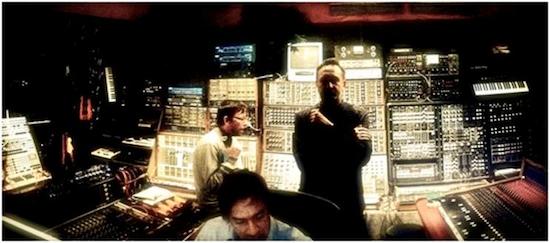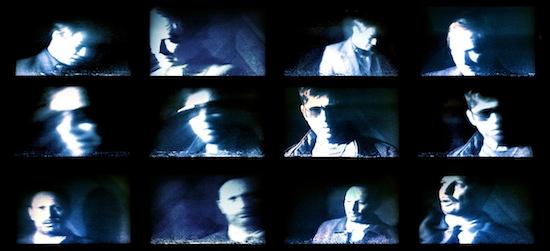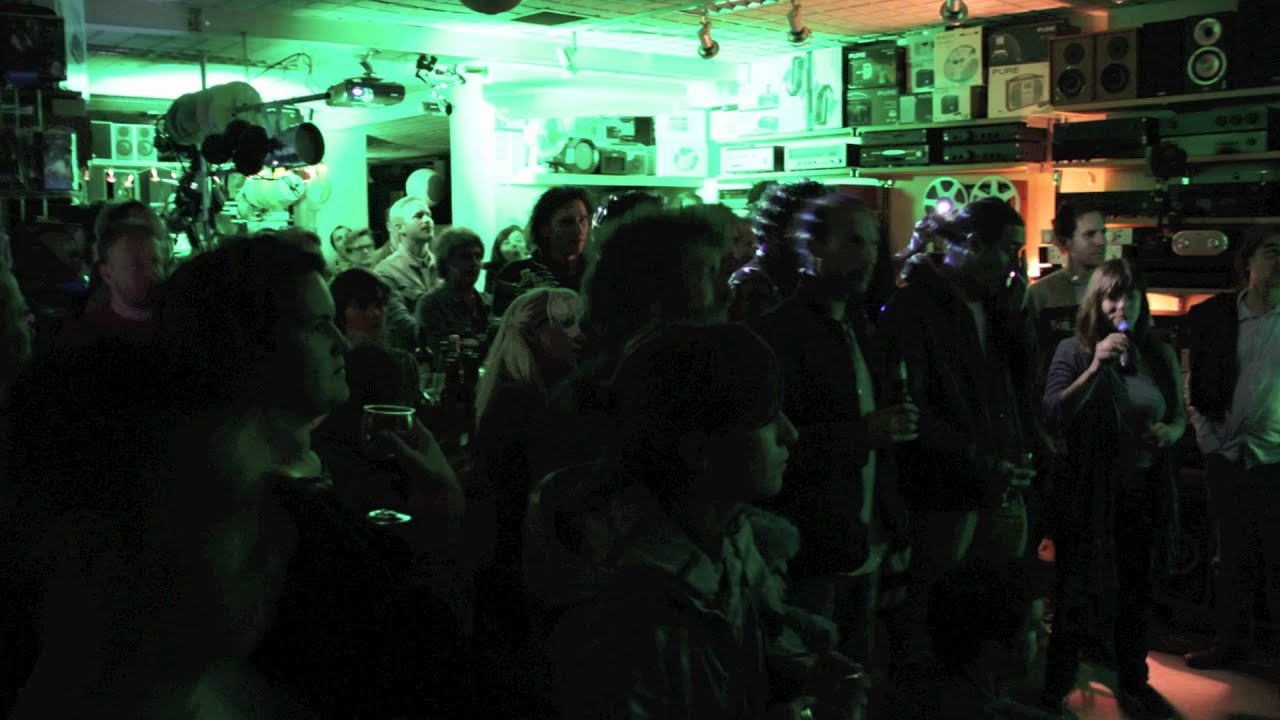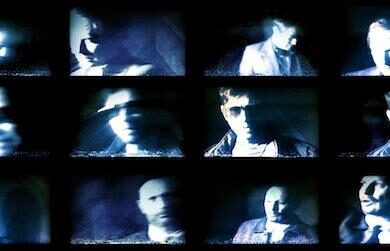There has been a breakdown in communication technology. This breakdown is an ongoing situation and is occurring outside a large, metal, multiple-locked warehouse door. This impressive barrier is protecting Ben ‘Benge’ Edwards’ studio and its large rooms packed with racks and racks of analogue synthesisers, sequencers and drum machines amassed over decades. Unfortunately the door doesn’t have a bell, and is therefore also protecting its musical treasure trove from those who have a rightful claim to access it. Outside the door and the synth packed warehouse space it protects, out on the cobbled Hoxton Street, is an instantly recognisable figure. He is fashionably dressed with a classic Sheffield wedge haircut. He looks at his smart phone in a perplexed manner. Stephen ‘Mal’ Mallinder announces in frustration: "I can’t get a signal anywhere." He tries a second phone but that doesn’t work either: "No signal!"
People start arriving in dribs and drabs. Steve Malins is here. He’s a hardworking publicist and manager who has been instrumental in helping revive the careers of the likes of Gary Numan and John Foxx. He is looking after Wrangler, the dark electronic, dubby pop group I’m here to interview. The three piece – featuring Benge, Mal and a third member Phil Winter – are set to release their debut album LA Spark on Memetune, which was recorded entirely on the analogue equipment on the other side of the door we can’t get through.
Malins tries his phone but to no avail. He asks if I got here ok, and I have to admit that due to a broken iPhone and a failure of GMaps I have been wandering round Hoxton in circles for ages. I found the location more by accident than design. I feel like the ironically titled smartphone is breeding us into a state of utter stupidity when it comes to practical matters.
"It’s another symptom of neoliberalism," replies Mal. "We’ve outsourced everything now, even our intelligence and resourcefulness."
Mallinder, who was a member of one of the most baleful, questioning and oppositional electronic acts of the 1970s and 1980s, Cabaret Voltaire, is in a chipper mood though. A moped with a tampered exhaust roars down the narrow road. The man partially responsible for such tracks as ‘Nag Nag Nag’ and ‘Spread The Virus’ shouts after it: "Yeah, thanks for the noise pollution mate."
Phil Winter of Tuung and Lone Taxidermist turns up. Upon seeing three men attempting to ring one number with four phones, he decides to do something constructive, and gets some cups of tea in instead of joining in.
I am in the process of wondering if the lack of doorbell to the studio is a knowing reference to Kraftwerk’s Kling Klang studio in Dusseldorf – which was equally hard to gain access to – but when the door is opened by Benge blinking at the sunlight, he seems genuinely surprised that anyone’s outside. "I really should get a bell for this place," he says, before ushering us all in.
I think the name Wrangler refers to someone who wrestles with something; what do all of you wrestle with, whether artistically or otherwise?
Benge: Well, you’re the first person to get the name. Everyone normally says, ‘Oh you’re named after the jeeps or the jeans.’ But yeah, it’s about wrestling with things. Originally me and Phil started the group just after I’d done 20 Systems, which was one track per synth, and we were going to carry on that idea for this project. And in fact we did do one track per synth for the first few songs we did. The idea is that we wrangle with synths.
Phil Winter: But on top of that, we’re also wrangling with finding the time to do it. Getting here. Getting home. [laughs] My whole life’s a bloody wrangle.
Mal: What did you say last week? You have to wrestle with the music and blow down its nose.
PW: But then when there’s three of us working on a synth, it is a bit like Twister.
BE: And when we do the mixing as well. It’s like a live performance almost. We’ve got a photograph of the dog getting stuck in and doing some wrangling as well.
Did you bring any additional wrangling to the table Mal?
SM: They were wrangling when I arrived, but it turns out I was equally equipped to wrangle. I was born to wrangle. It’s in my genes. That’s wrangling genes, not Wrangler Jeans. I think the idea of exerting control over all these machines is something I find fascinating anyway. I was happy to join in.
Where does wrangling come in the great nature/nurture debate? Are men like you born to wrangle, or do they have wrangling thrust upon them?
SM: I think it is in all of us.
PW: I think you miss wrangling if you aren’t doing it.
My life consists of panicking about a diary that is too full of work, and the three afternoons per year when I have completed all the work in the diary. And on those three afternoons, my soul rapidly drains of meaning. And then my soul and my diary are a terrifying void echoing in unison. So I fill my diary up with too much work again.
PW: Yes.
BE: Yes, that’s it.
SM: That is exactly it.

The group started with Ben and Phil, so tell me how you two met.
BE: Phil plays in a band called Tuung and they were born at my old studio in Museum Street because Mike, my colleague, produced their album.
PW: But I’d known Ben longer than that even, we used to DJ on the same bills playing electronica back in the 90s. I was always trying to blag records off him…
BE: Wrangler was born in 2009.
PW: We did a split single for Static Caravan; that’s when I remember you coming up with a name.
BE: So it’s very much related to 20 Systems, because we did a single called ‘2 Systems’ which had us on one side and Scanner on the other. That was our first release.
Mal, what have you been doing creatively since leaving Cabaret Voltaire?
SM: Well, I was living in Australia. It must have looked like I disappeared off the face of the Earth over here. I started doing a radio show. I set up a record label, OffWorld Sounds. We had about thirty releases, some of which was me under the Ku-Ling Bros label. Sassi And Loco was another one of mine. We put out stuff from all over the world. We put out Filla Brazillia, we put out people from Vienna, hip hop from Brooklyn, Australian artists… Did the label, set up a production company, set up a festival in Sydney and Melbourne, I was a radio producer and did some bits of teaching. I think Jarvis started a rumour that I’d become a sheep farmer.
How did you get involved in Wrangler?
SM: Phil is very much the central point in this. We’ve been friends for a very long time, from when I was in the Cabs. Pretty much as soon as I came back from Australia Phil was saying to me, "You’ve got to listen to 20 Systems…" And then he was playing me all the embryonic Wrangler stuff. So I met Benge and then pretty much since half an hour after meeting him we’ve been making music, because I thought I was just coming up for a cup of tea and to say hello.
What’s the process? If you’re all doing a bit of everything – bar singing – how does the song writing and production pan out?
BE: A lot of the tracks are things that Phil and I had done originally and then Mal came in and put vocals on. Then we built the tracks up and put arrangements on. Then last year I went away to America to work on a project out there for a couple of months, and I wrote a couple of tracks out there that we used on the album. But they were just very simple backing tracks that I sequenced with a drum pattern, which I then brought in here and we built them up into songs on the album that way.
SM: I think one of the processes was working from sketches and ideas, and it’s great doing that here, because you’ve got space to plug in and play. A lot of it comes from going through there [motions to live room], setting up and playing live.
PW: Yeah, it’s quite old school in that we’ll be going through amps. Quite like a punk band in a rehearsal studio going through amps and just seeing what comes out. It’s not quite jamming but there is an element of us smashing stuff together or mixing it up and seeing what comes out.
SM: It’s good because you sidestep the layering of the music. Usually working on electronic music you work on one sound until you get it right and then move on to the next, but when there’s three of you playing live, you get a much clearer sense of which sounds work together. Usually the process is a lot more modular, no pun intended, but this way is a lot more organic.
Some of the tracks on the album are reminiscent of a certain period in Cabaret Voltaire’s back catalogue. Now that might be simply because it’s got your very distinctive vocals on the track, but also because you’re using vintage gear. The Cabs are quite unique in some ways in that they’re a very ‘important’ band in how revolutionary they were at the time, but by and large they haven’t really had the kind of critical acclaim that has been afforded to other acts. How does this sit with you – the legacy of Cabaret Voltaire – and is it something you have to work on avoiding?
SM: I’m more conscious of it from the perspective of these guys, because as far as I’m concerned Wrangler is something quite unique and different. When you make music it’s about working with people, and Benge is very different to me. I can understand that some of the textures are similar, but that’s inevitable. It’s just the way that it works. It’s a shame that we have to say it’s me in some ways, because I would hate it to be a millstone. That’s not to say the legacy of the Cabs isn’t important, because it is, but I think it’s more important what we’re doing as three people. Although perhaps I don’t have the distance from the subject to be objective, and this is a very subjective idea.
In terms of the legacy of The Cabs… it’s quite odd. The name, the cachet of the band, the body of work – we did a lot of stuff. It’s all there. You can’t just wipe it away. So it’s always going to be there in anything we do. But time has collapsed and we live in a perennial present, and all of our history is just constantly there. It’s just there for everyone to see. I think the thing to do is to embrace it, but not worry about it too much. The Wrangler album stands up on its own. I really hope that some people hear the album and think, ‘This is really good, I’ve never heard of Cabaret Voltaire, I’ll go and listen to something by them.’
WRANGLER/SEQUENCE ON video 2.0 from disco_r.dance on Vimeo.
The canonical way of looking at Cabaret Voltaire is that they were an important band when Chris Watson was a member and I agree, because I really like that music. But for me the stuff that Cabs did in the early to mid-80s is the best stuff and still stands up as amazing dance music now. Do you think that younger people are starting to see beyond the chaotic early years and are starting to appreciate the breadth of your back catalogue and do you think the recent Mute boxset has helped in that shift in perceptions?
SM: I hope so. It’s funny you should say that, because recently The Wire decided what the Cabs narrative was going to be, and I mean no disrespect to The Wire, but there is an air in which the magazine is saying, ‘We’re going to write the narrative, we’ll decide what the story is.’ Most of my friends and the people I know, they’d take everything up to and including us working with Marshall Jefferson in Chicago. And I’m friends with Chris and working with him, and really like and respect what he went on to do after Cabs, but I think it’s unfair to Richard and I think sometimes unfair to me as well, saying, ‘Well, that was the good stuff, then it went all…’
I think we’d all say the same thing as well, that groundbreaking music in that period of the 1980s was made with machinery. It was happening in New York. It was happening in Germany. It was happening where we were. And it wasn’t just esoteric. It was rhythmical as well. That period of music should be respected; not just what we did. I know club cultures have gone on to say that was the origins of it all, and club cultures have made electro and New York club music a bit shit and cheesy but the truth is, it’s not. It was interesting and ground-breaking. That was the punk of its time.
Bearing all this in mind, when you do a couple of Cabs numbers live, is this just because they’re fun to play? Do you have to put any effort into making them sound different?
BE: The first gig we did, we didn’t have enough songs.
SM: We were going to Austria weren’t we and they said, ‘Will you do some Cabs numbers?’ So we said, ‘Oh, alright.’ Just to make the set long enough but that was the only occasion we did over one track. Although we did play ‘Crackdown’ recently.
I like the album LA Spark. It’s enjoyable to listen to. What I don’t like however, is that you’ve named your album after LA. Los Angeles is like Warrington with palm trees. Why did you name your album after this awful, awful town?
BE: I don’t know really. I spent two months there last year and that track ‘LA Spark’ was something I wrote out there and then it ended up being the name of the album. I don’t know how that happened really.
SM: Wasn’t it going to be Le Spark for a bit? It’s too fucking late now John! You should have said something sooner…
PW: And Le Spark had that kind of disco feel to it and a bit of a nod to Chic. I don’t know what happened to that.
Did it get wrangled?
SM: Yeah, it did.
Mal, in the 1980s, I think it would be fair to say that your lyrical concerns were religion, the apparatus of state control, paranoia, brain washing, stuff like that. Do you think your preoccupations have altered since then?
PW: I hope not.
SM: [emphatically] NO! I mean ‘Lava Land’, ‘Modern World’ are all about modern technology. But I do write them so that they are open to interpretation by the listener. I’d hope that there was an ambiguity about them, but some of the lines obviously do loan themselves to an interpretation along those lines and on that level. Apart from ‘Space Race’, which is actually about a race in space.
Is all the equipment you use analogue, and does it matter?
BE: There’s some early digital but it’s all instruments as opposed to computer plug-ins.
PW: It doesn’t matter but having said that it is all analogue. And it’s all played rather than sequenced as well.
Are you giving yourself something to wrangle against?
PW: Yeah. That’s it.
BE: You can’t wrangle with a mouse. They’re too quick and too small.
Given the background that you’re all from, what do you make of the current boom in popularity of analogue synths? You’ve had guys like Oneohtrix Point Never on the front cover of The Wire, you can’t open a magazine without seeing a reference to Daphne Oram, Delia Derbyshire and the Radiophonic Workshop or go to a festival without seeing at least two people with modular synths on stage…
BE: I think it’s amazing. It’s really exciting for me, because I’m so into electronic stuff. But it’s cyclical isn’t it? We’ve been through band music in the 90s, been through a folky revival, we went through all the glitchy laptop stuff and now here we are. People got fed up with hearing music that was all done inside a computer and people have come to realise that when you play an instrument you approach it in a different way.
PW: Maybe things will change when people realise that they have to fix them or that it’s a nightmare when you have to move house. But perhaps we’re different because we never stopped using analogue synths, and Benge managed to put together such an amazing collection of them.
Mal, the industrial sound has become relatively popular again, especially in the field of techno – there are a lot people moving from the noise scene to the techno scene, and you have DJs dropping things like Nitzer Ebb and Cabaret Voltaire into their sets. Generally speaking I think this is a good thing, purely because I like the sound. But is there also a problem with this appropriation if it’s divorced from its original role as dance music in opposition, or as a satire of the state, and removed from its once Dadaist and surrealist intent?
SM: Yeah, it becomes a little bit of an affectation really, just people playing with sounds.
PW: Or it has become. Without the politics and some sort of aggressive disagreement with the status quo, which is the sort of industrial music I like – it’s informative, has an agenda and has an attitude – then what is it? It’s not like there aren’t things to get angry about.
That’s what I was going to ask about – these are the worst times socially that I can remember since the mid-80s. Why isn’t there more oppositional angry music?
PW: I think it will come. And it’s not just this country. There’s South America and the Balkans to consider.
SM: As a pampered Western culture we’re very easily distracted by bright lights and baubles, aren’t we, and there will come a point when people won’t be any more. There will be an epiphany where people will realise that their eyes have been glazed over for so long. There are political undercurrents of course, but strangely it mainly seems to be divorced from the creative process. That’s what disturbs me. When [Cabaret Voltaire] were around we were trying to express something about oppositional politics, but at the moment so much music lacks the need to articulate something like that. But maybe it lacks the outlets… I don’t know.
But also I feel that people are finding it harder to work out what they should be opposing and who the enemies are. There are new monolithic corporations coming up, whether they’re Google or whatever, [and] they’re creating new power structures but I don’t think we’re entirely sure what these power structures are yet. It was easier in the 80s because it was very specific and the lines were quite clear. You knew who to attack, where to attack them and via what channels, but in the world of everything, knowing who the enemies are is the real difficulty.
PW: Another difference between now and the 80s is that back then, even in the darkest times you’d have music that was really ecstatic and telling you to party and have a good time, or you’d have music telling you to riot and kick fuck out of the state. Now you have neither… just this… nothing music.
SM: And the music that used to soundtrack those ecstatic moments has been completely corporatised. We used to be in control of those moments. You came through rave, you know about this. It was a continuation of how we got together socially and culturally and created our own bits of collective ecstasy. But now it’s all branded and we’re herded into it. It’s all branded and it’s corporate festivals or large scale EDM in America. We’ve got no spaces left to go to.
To sum up then; life, it’s a bit like a trip to IKEA with a meat grinder at the far end. Can we find alleviation from the pain of modern industrial living in a bit of wrangling?
SM: It works for us! I recommend it. You can’t solve everyone’s problems, you have to solve your own first.
PW: I’d recommend it. Idle hands and all of that…
Wrangler’s album L.A. Spark is out now via Memetune. They play Rough Trade East Shop, London on May 14, support Com Truise at London’s Shapes on 31st May, and play at the Hare And Hounds, Birmingham on August 23




